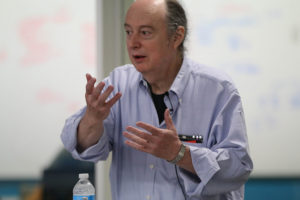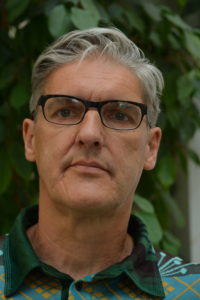CNI Fall 2017 Membership Meeting
December 11-12, 2017 | Omni Shoreham Hotel, Washington, DC
| Opening Plenary Clifford Lynch, CNI |
Closing Plenary Herbert Van de Sompel Paul Evan Peters Award & Lecture |
Opening Plenary
Monday, Dec. 11, 2017
CLIFFORD LYNCH
Executive Director, Coalition for Networked Information
Overview of the 2017-18 CNI Program Plan

Closing Plenary
Tuesday, Dec. 12, 2017
 |
Paul Evan Peters
|
During the 1-year sabbatical I just spent at DANS in The Netherlands, I have familiarized myself with the motivations, standards, and technologies associated with the Decentralized Web movement, especially those that leverage the HTTP protocol stack. During this exercise, I have also explored whether and how these novel approaches could be used as a foundation for a global scholarly commons, and what a minimally viable platform could be. I have closely followed, and at times collaborated with, early career researchers that do pioneering work in this realm. My investigations have led me to believe that – technically – decentralized web approaches can be applied to arrive at a researcher-centric and institution-enabled system in which the core functions of scholarly communication (registration, awareness, certification, archiving) can appropriately be fulfilled. The standards required to arrive at an interoperable, distributed, web-native system are largely in place. The tools that illustrate this potential remain experimental and brittle, yet show a glimpse of a possible future. My enthusiasm regarding these technical opportunities is tempered by a healthy portion of realism regarding the mere possibility of initiating profound change in scholarly communication. My reservations are based on the modest progress that has resulted from a plethora of efforts over the past two decades (some of which I was actively involved in), and on the understanding that global collective action on behalf of academia is required to give a scholarly commons effort the momentum it needs to stand a chance of success. In this talk, I will share a snapshot of my evolving thinking about a future that could be, and hopefully inspire CNI representatives to explore complementary avenues, beyond the technical one that remains my focus.
About the Speaker
An accomplished researcher and information scientist, Van de Sompel is perhaps best known for his role in the development of protocols designed to expose data and make them accessible to other systems. These initiatives include the OpenURL framework (stemming from his earlier work on the SFX link resolver), as well as the Open Archives Initiative (OAI), which included the Protocol for Metadata Harvesting (OAI-PMH) and the Object Reuse and Exchange (OAI-ORE) scheme. Other notable contributions include the Memento protocol, which enables browsers to access earlier versions of the Web easily, and ResourceSync, which allows applications to remain synchronized with evolving content collections.
Van de Sompel received a Ph.D. from Ghent University in 2000, working on context-sensitive linking, which led to the OpenURL standard and library linking servers. Following stints at Cornell University and at the British Library, in 2002 he joined the Los Alamos National Laboratory as an information scientist, where he now leads the Prototyping Team at the Research Library. He also serves as visiting professor at the DANS data archive in the Netherlands.
Van de Sompel served as a member of the European Union High Level Expert Group on Scientific Data, as well as the Core Experts Group for the Europeana Thematic Network, charged with building a digital repository of European cultural assets. He has won numerous awards, including the Los Alamos National Laboratory Fellows Prize for Outstanding Research (2015) and the SPARC Innovator Award (2006) by the Scholarly Publishing and Academic Resources Coalition (SPARC), of which he was the first recipient.